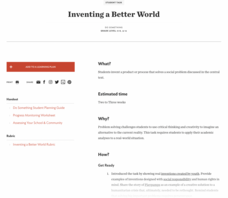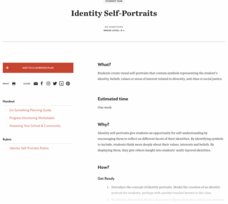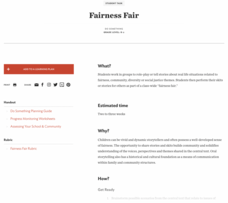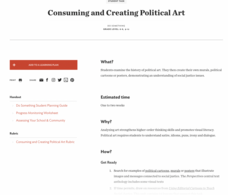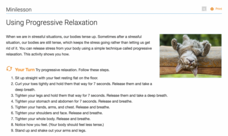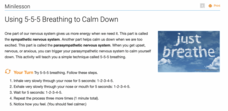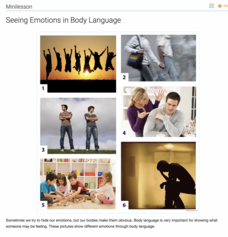Teaching Tolerance
Inventing a Better World
From play pumps that provide clean water to shoes made from trash, innovators change the world one invention at a time. After researching various inventions, young entrepreneurs develop their own. Extension opportunities include prompts...
Teaching Tolerance
Identity Self-Portraits
What symbols represent you best? Individuals consider how they would draw peers using symbols about their identities with an interview and art activity. After conducting interviews and portraits, the art makes a great centerpiece for...
Teaching Tolerance
Identity Artifacts Museum
Who are you? It's a simple question, but younger learners have the opportunity to express their complex identities by making artifacts that represent parts of their identities. After engaging in the activity, they share who they are with...
Teaching Tolerance
Fairness Fair
How can we create a more fair world? Chances are, class members have some ideas! After reading a text about fairness, individuals create skits around the ideas of fairness. Extend the learning and make their presentations a...
Teaching Tolerance
Consuming and Creating Political Art
A picture is worth a thousand words, but political art may be worth even more! After examining examples of political cartoons, murals, and other forms of public art, class members create their own pieces to reflect their ideals and...
Thoughtful Learning
Using Perspective Shifting to Imagine History
Imagine what it would have been like to walk from Georgia to Texas! Perspective shifting, a key part of developing social awareness, involves just this sort of imaging. A short mini-lesson asks learners to shift their point of view and...
Thoughtful Learning
Using Perspective Shifting to Understand Others
Being able to see things from another's perspective is an important part of social awareness. A short activity permits scholars to practice perspective-taking, which in turn helps them develop empathy, appreciate diversity, and promote...
Thoughtful Learning
Using Progressive Relaxation
Stress makes a mess of our minds and bodies. Like a vicious circle, stress causes our bodies to tense and makes it more difficult to get rid of the stress. Break the cycle for you and your students by practicing progressive relaxation....
Thoughtful Learning
Creating a Growth Mindset
A quick mimi-lesson models how to replace a fixed mindset with a growth mindset, a mindset that says improvement is possible with practice. Included is an activity that asks individuals to rewrite 10 fixed mindset statements with 10...
Thoughtful Learning
Using 5-5-5 Breathing to Calm Down
Scholars calm their minds and bodies with a 5-5-5 breathing exercise. Learners breathe in for five seconds, out for five seconds, then wait five seconds to start again. The exercise takes one minute to complete.
Thoughtful Learning
Recognizing Bullying
Boost social awareness with an activity that challenges scholars to recognize bullying. Participants read 10 scenarios and respond after carefully examining behaviors such as body language, facial expressions, and frequency.
US Department of Homeland Security
Psychological First Aide (PFA) for Students and Teachers
Listen, protect, connect! Using the resource, teachers learn how psychological first aid helps scholars adjust after a crisis or school emergency. They discover how to observe changes in pupils' school performance, listen and offer...
Transforming Education
Self-Management Strategies
What self-management techniques help scholars achieve their goals? Readers review a list of strategies for managing stress, increasing motivation, and setting goals. They discover how to monitor their emotions, create checklists to stay...
Thoughtful Learning
Seeing Emotions in Body Language
Scholars test their skills of reading body language with a collaborative learning experience that focuses on showing and identifying emotions. Pairs take turns acting out an emotion, one uses body language while the other guesses what...
Indiana Department of Education
Social Emotional Learning Competencies PK-12 Lesson Plans
Looking for lesson plans that address social and emotional learning competencies? Here's help in the form of a 166-page packet that includes lesson plans for elementary, middle, and high school learners. Seven detailed plans are provided...
McGill University
Independent Learning
A 10-lesson unit focuses on the importance of homework, how to set up a homework space and schedule, and strategies that aid homework completion. Also included is a list of things learners can do to help them stay focused on their...
McGill University
Peer Relationships
A nine-lesson unit introduces learners to strategies they need to develop healthy peer relationships. The scripted lessons focus on the etiquette of two-way conversations, sharing and turn-taking, good sportsmanship, and the...
McGill University
Emotional Regulation
A unit of 10 scripted lessons is designed to help learners develop awareness of their emotions and of positive coping strategies they can use to regulate their emotions. They also learn how to replace negative strategies like self-blame...
Thoughtful Learning
Using Positive Self-Talk
Boost positive self-talk with a chart that turns negative feelings into happy ones. Scholars write down their negative emotions then rewrite them with a positive flair to aid in changing their outlook.
Thoughtful Learning
Checking the Emotion Thermometer
A hand-drawn thermometer provides a strong visual for how much of an emotion a child is feeling. Scholars color the thermometer's mercury to showcase whether what they are feeling is high or low at a certain moment. Questions allow...
Transforming Education
Social Awareness Strategies
What are the benefits of developing social awareness? Using the resource, readers learn strategies for fostering civil discourse, creating a participatory classroom, and enhancing family involvement. Scholars also take a personality...
Thoughtful Learning
Doing Random Acts of Kindness
Encourage scholars to perform random acts of kindness. A lesson challenges participants to choose a peer they wish to be kind to without them knowing. Learners list five good deeds and choose one to fulfill. Pupils reflect on the process...
Council for the Curriculum, Examinations and Assessment
Managing Influences and Making Decisions
Does patience help people become more responsible? Class members explore the topic with a What's It To Do With Me? quiz to assess their personal responsibilities. They engage in a whole-class discussion about pros and cons of instant...
Purdue University
Benefits of Connecting with Nature
Feel the healing effects of nature. Individuals learn about the benefits of nature using imagery. They begin by defining words to express how they feel emotionally and then practice using those words with hands-on activities. Once they...


